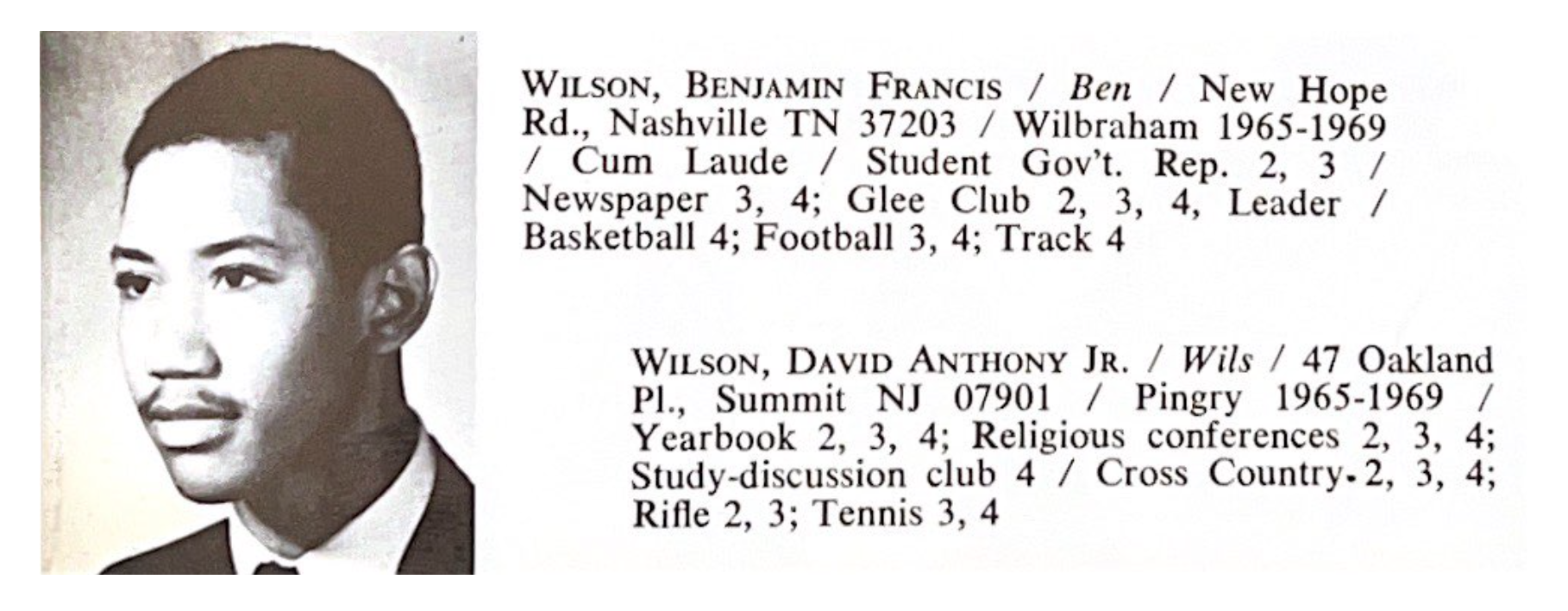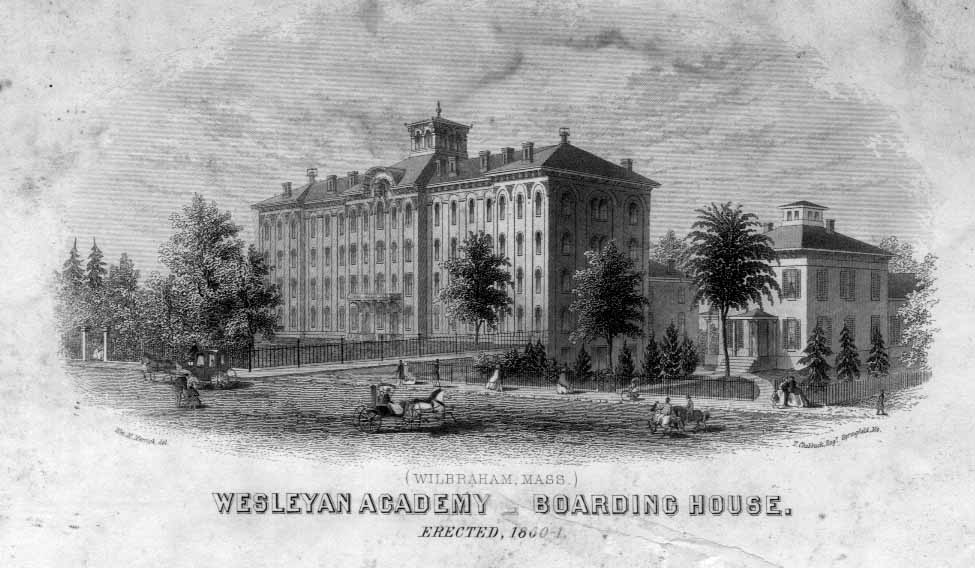"I had a chance": A Lifetime of Learning at Wilbraham Academy

"I know just the little boy!": Recruitment and Admission
For Ben, his family’s focus on education came with personal sacrifice. As he recalls in the interview, Ben’s plans to attend the local all-Black high school were suddenly uprooted by the news of his admission to Wilbraham. Describes Ben of his recruitment:
“... What happened was, there was a woman who taught English at Jackson State, Mrs. Tatum, and she went to Stratford, Connecticut… And she sat next to the Dean of Admissions from Wilbraham Academy, my school, and he told her they were trying to recruit negro boys to come to their school… Wilbraham had established a policy as a result of complaints by some parents from the South that they would no longer admit negro boys… So now, in the mid-1960s, they are about to integrate again, and I am one of those little boys… So, Mrs. Tatum said, told this admissions director, “I know just the little boy!” And so they gave me the standardized test, and apparently, I did well on it.”
Ben’s father’s legacy and his mother’s commitment to honest excellence loomed large throughout the process. Recalls Ben of his testing process,
“My father asked the head of guidance counseling at Jackson State, “How's he doing on the test?” Of course, he shouldn’t have asked him that and the gentleman said, ‘Well, so far, he's doing well, he's got ‘em all right!’ Apparently, I did well on the test.”
Ben excelled far beyond the school’s admissions requirements. Yet, his academic qualifications were not sufficient to ensure his enrollment. At the time of Ben’s acceptance, his father was still earning a meager salary of $8,400. While his mother worked outside the home, Wilbraham’s annual tuition of $2,700 far exceeded the family of six’s expendable income.
Ben initially turned down the offer of admission on financial terms. However, a committed international student rescinded their offer after complications obtaining a VISA, clearing up a half scholarship which would be offered to Ben. Recalls Ben,
“And my parents paid for the rest, and I had jobs at the school. So we visited my grandfather in upstate New York. Had we known I had been admitted I would have gone to visit the school, it was only two and a half hours away. But now I'm back in Mississippi, my father opens the mail. He says he spoke to my mother about it, he says you're going to go to that school.”

"It's like going to college except I was 14, not 18": Leaving Home
Though Ben readily accepted his offer to Wilbraham, he reflected upon the moment as a bittersweet departure. Forced from his adolescence, family, and an expectant community, Ben recalls that
“I was so disappointed. I wanted to go to my neighborhood, all-Black high school, the coach had my helmet, I was so ready… It was bittersweet because I was leaving my home, I was leaving three younger brothers, I was leaving my mother and father. It's like going to college except I was 14, not 18… So within a week, I had to read three books, my mother took me downtown, she bought me an additional suit, I got my own comb and brush for the first time, and she put me on a plane.”
Ben is now able to look upon this transformation with fondness. Though he still grieved what could’ve been in Jackson, and still speaks highly of the rigor and breadth of subjects he was offered at the laboratory school, he remarked that Wilbraham
“...changed my life, you know, really forever. Because it put me in New England, and now I was at this prep school and I was going to have really good competition for the first time and I was excited about it, I had a chance to prove what I could do.
David and Goliath: Adjustment and Advantage

In order to help ease the burden of tuition, Ben worked several jobs while at Wilbraham, washing dishes at the school’s dining hall and manning the “spa”, or stand where a local woman sold hot dogs and hamburgers in the evenings in exchange for free food. Describing his younger self, Ben remarks that “I was always hungry”, and that his responsibilities bred an early appreciation for work ethic. Beyond the added responsibilities of living independently and working, Ben remembers that Wilbraham was also an academic challenge. Operating on a grading scale of 0 to 80 rather than 0 to 100, Ben describes initially struggling to adjust to the school before adopting a disciplined routine.
“They were not interested in your simply regurgitating the facts… they wanted us to be critical thinkers. And so that was a transition that I had to make. And I, I remember I came home, I had these grades. I remember, I had a 75 E. E meant excellent effort… I don't think my mother understood [the scale]. And she was very disappointed, and ‘You have to do better.’ So I started— I would get up at 4:30 in the morning. And I would study when others were sleeping — and my grades improved... From my 10th grade year on, I was a top student thereafter.”
Once again, Ben describes the impact of his mother’s death on his expectation to succeed.
“But one of my disappointments, my mother died when I was in 10th grade. And, for the first time, when I made the highest honors, which meant I had a honors grade in every course. And, there were only like one or two other students in my class who done that. But she was in a coma. And I never got to tell her that I’d finally done what she wanted to see me do. And, but like all children, I wanted my parents to be proud of me.

Ben recalls that though the adjustment was not always easy, fate had granted him enough “hidden advantages” to ease navigating the abrupt change to life up north and without his parents. His father’s parents’ home in New York was a prime example – as Ben told the story of how he was able to recognize colonial general Nicholas Herkimer before being taught colonial history because of the name’s adoption on the Thruway near his grandparent's house. Using David and Goliath as an analogy for the unique advantages which helped him surmount difficult circumstances, Ben says,
“Gladwell's theory is not having everything is a good thing. And his theory is that that what appears to be a disadvantage, can be an advantage.”
Another unique advantage instilled by his parents was Ben’s sense of resilience in the face of unfairness and inequality. When asked if commuting between the north and south affected how he felt he deserved to be treated, Ben instead interjected that his parents taught him not only that he deserved to be treated well, but to hold himself and people in his life to high expectations.
“it’s how I expected to be treated. But their ultimate message was… not that this was not unfair… but you have to succeed anyway, you have to win anyway, and in fact, from my father, the unfairness of it should heighten [laughter] should raise your competitive level."
This competitive spirit and impressive ambition would serve Ben well in his college application process. Following in the footsteps of other Black alumni from Wilbraham, Ben committed to Dartmouth for football, where he would play with the best team in Dartmouth history while earning the highest academic honors.
- Legacy: Benjamin Wilson ‘73 (Emilie Hong ‘25, Fall ‘22)
- An Oral History Interview with Benjamin Wilson, '73
- Long Strides: Harrison B. Wilson and HBCUs
- "My mother's spirit is speaking through them": Anna G. Wilson in Life and Death
- "I wanted to know why": History and the Deep South
- "I had a chance": A Lifetime of Learning at Wilbraham Academy
- A Family Tradition: Life at Dartmouth
- Living With Legacy: Career, Love, and Community Post-Graduation
